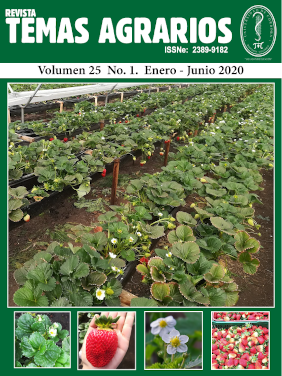Efectividad de enmiendas sobre el crecimiento y rendimiento de fréjol común en suelo andisol ácido
Efectivity of amendments on growth and yield of common beans in an acidic andisol soil

Esta obra está bajo una licencia internacional Creative Commons Atribución-NoComercial 4.0.
Mostrar biografía de los autores
El objetivo de la investigación fue evaluar el efecto de varias enmiendas sobre el crecimiento y rendimiento del fréjol común en un suelo andisol ácido de la zona de Santo Domingo de los Tsáchilas, Ecuador. Los tratamientos evaluados fueron T1 (Humus +harina de rocas), T2 (Humus + dolomita), T3 (Compost +harina de rocas), T4 (Compost + dolomita), T5 (Gallinaza +harina de rocas), T6 (Gallinaza + dolomita), T7(Fertilización convencional) y T8 (Control). El diseñoutilizado fue de bloques completos al azar con tres repeticiones. Las principales variables registradas fueron peso seco de planta (g), rendimiento de grano (kg ha-1) y pH del suelo. Los tratamientos de enmiendas influenciaron significativamente (p<0,05) el peso seco de planta, el rendimiento de grano y el pH del suelo. Los tratamientos más efectivos fueron las combinaciones de dolomita + gallinaza, compost y humus, que incrementaron el crecimiento en términos de peso seco en 22, 27 y 31%, respectivamente, en relación al tratamiento control. El mayor incremento en rendimiento de granos también fue alcanzado con dolomita + gallinaza, compost y humus, con 21, 28 y 30%, respectivamente, en relación al tratamiento testigo. El pH del suelo fue elevado hasta 5,74; 5,76 y 5,85 con dolomita + gallinaza, compost y humus, respectivamente. La aplicación de enmiendas alcalinizantes debe ser una práctica común para potenciar crecimiento, rendimiento y respuesta a la fertilización del frejol común en suelos andisoles ácidos.
Visitas del artículo 808 | Visitas PDF
Descargas
- Alemu, H. 2017. Review Paper On Breeding Common Bean (Phaseolus Vulgaris L.) Genotypes For Acidic Soil Tolerance. International Journal of Advanced Research and Publications 1(3): 39 – 46.
- Ameyu, T. 2019. A Review on the Potential Effect of Lime on Soil Properties and Crop Productivity Improvements. Journal of Environment and Earth Science 9(2): 17 – 23.
- Bekele, A., Kibret, K., Bedadi, B., Yli-Halla, M. and Balemi, T. 2018. Effects of Lime, Vermicompost, and Chemical P Fertilizer on Selected Properties of Acid Soils of Ebantu District, Western Highlands of Ethiopia. Applied and Environmental Soil Science 8178305: 1 – 13.
- Castán, E., Satti, P., González-Polo, M., Iglesias, M.C., Mazzarino, M.J., 2016. Managing the value of composts as organic amendments and fertilizers in sandy soils. Agric. Ecosyst. Environ. 224: 29–38.
- Castro, H. y Munevar, O. 2013. Mejoramiento químico de suelos ácidos mediante el uso combinado de materiales encalantes. Revista U.D.C.A Actualidad & Divulgación Científica 16 (2): 409 – 416.
- Castro, H. y Guerrero, J. 2018. Evaluación de materiales de encalado mediante pruebas de incubación en un oxisol de la altillanura colombiana. Revista de Ciencias Agrícolas 34(2):14-26.
- Dida, G. and Etisa, D. 2019. Effect of Lime and Compost Application on the growth and yield of Common Bean (Phaseolus Vulgaris L.): A Review. Advances in Oceanography & Marine Biology 1(3): 1 – 9.
- Effa, E., Mofunanya, A. and Ngele, B. 2019. Effect of Organic Manure and Agricultural Lime on Growth and Yield of Two Bean Varieties. International Journal of Plant & Soil Science 30(4): 1-18.
- Fekadu, E., Kibret, K., Melese, A. and Bedadi, B. 2018. Yield of faba bean (Vicia faba L.) as affected by lime, mineral P, farmyard manure, compost and rhizobium in acid soil of Lay Gayint District, northwestern highlands of Ethiopia. Agric & Food Secur 7(16): 1 – 11.
- Habtamu, A. 2017. Review Paper On Breeding Common Bean (Phaseolus Vulgaris L.) Genotypes For Acidic Soil Tolerance. International Journal of Advanced Research and Publications 1(3): 39 – 46.
- Hagemann, N., Joseph, S., Schmidt, H., Kammann, C., Harter, J., Borch, T., Young, R., Varga, K., Taherymoosavi, S., Elliott, K., McKenna, A., Albu, M., Mayrhofer, C., Obst, M.; Conte, P., Dieguez, A., Orsetti, S., Subdiaga, E., Behrens, S. and Kappler, A. 2017. Organic coating on biochar explains its nutrient retention and stimulation of soil fertility. Nature Communications 8(1089): 1 – 11.
- Kammann, C., Schmidt, H., Messerschmidt, N., Linsel, S., Steffens, D., Müller, C., Koyro, H., Conte, P. and Joseph, S. 2015. Plant growth improvement mediated by nitrate capture in co-composted biochar. Scientific Reports 5(11080): 1 – 12.
- Kätterer, T., Roobroeck, D., Andrén, O., Kimutai, G., Karltun, E., Kirchmann, H., Nyberg, G., Vanlauwe, B., de Nowina, K.R., 2019. Biochar addition persistently increased soil fertility and yields in maize-soybean rotations over 10 years in sub-humid regions of Kenya. Field Crops Research 235: 18–26.
- Kim, M., Min, H., Lee, S. and Kim, J. 2016. The Effects of Various Amendments on Trace Element Stabilization in Acidic, Neutral, and Alkali Soil with Similar Pollution Index. PLoS ONE 11(11): e0166335. doi:10.1371/journal.pone.0166335.
- Lal, N. 2016. Effects of Acid Rain on Plant Growth and Development. e-Journal of Science and Technology 11(5): 85 – 108.
- Legesse, H., Nigussie, R., Gebeyehu, S., Bultosa, G. and Mekbib, F. 2013. Response to Soil Acidity of Common Bean Genotypes (Phaseolus vulgaris L.) Under Field Conditions at Nedjo, Western Ethiopia. Science, Technology and Arts Research Journal 2(3): 03-15.
- Li, Y., Cui, S., Chang, S. and Zhang, Q. 2018. Liming effects on soil pH and crop yield depend on lime material type, application method and rate, and crop species: a global meta-analysis. Journal of Soils and Sediments 19: 1393–1406.
- Lunze L., Kimani P., Ngatoluwa, R., Rabary B., Rachier G., Ugen M., Ruganza V. and Awad Elkarim E. 2007. Bean improvement for low soil fertility in adaptation in Eastern and Central Africa. In: Bationo, A., Waswa, B., Kihara, J. & Kimetu J. (Eds.) Advances in integrated soil fertility management in sub- Saharan Africa: Challenges and Opportunities, pp. 325 – 332. Springer, Dordrecht, The Netherlands.
- MAG (Ministerio de Agricultura y Ganadería). 2017. Boletín Situacional de Fréjol Tierno y Seco. Sistema de Información Pública Agropecuaria (SIPA). Quito, EC. 8 p.
- Mite, F., Medina, L. y Espinosa, J. 2009. Efecto de la corrección del pH en el rendimiento de piña en suelos volcánicos. Informaciones Agronómicas 73: 1 – 5.
- Otieno, H., Cheminingwa, G. and Zingore, S. 2018. Effect of Farmyard Manure, Lime and Inorganic Fertilizer Applications on Soil pH, Nutrients Uptake, Growth and Nodulation of Soybean in Acid Soils of Western Kenya. Journal of Agricultural Science 10(4): 199 – 208.
- Peralta, E., Murillo, A., Mazón, N., Pinzón, J., Villacrés, E. 2013. Manual Agrícola de fréjol y otras leguminosas. Cultivos, variedades y costos de producción. Publicación Miscelánea # 135. Tercera Edición. Programa Nacional de Leguminosas y Granos Andinos. Estación Experimental Santa Catalina. INIAP, Quito, Ecuador. 70 p.
- Petry, N., Boy, E., Wirth, J. and Hurrell, R. 2015. Review: The Potential of the Common Bean (Phaseolus vulgaris) as a Vehicle for Iron Biofortification. Nutrients 7: 1144-1173.
- Pérez, A., Martínez, E., Vélez, L. y Cotes, J. 2013. Acumulación y Distribución de Fitomasa en el Asocio de Maíz (Zea mays L.) y Fríjol (Phaseolus vulgaris L.). Rev.Fac.Nal.Agr.Medellín 66(1):6865-6880.
- Rangel, A., Rao, I. and Horst, W. 2007. Spatial aluminium sensitivity of root apices of two common bean (Phaseolus vulgaris L.) genotypes with contrasting aluminum resistance. J. Exp. Bot. 58: 3895-3904.
- Rahman, M., Lee, S., Ji, H., Kabir, A., Jones, C. and Lee, K. 2018. Importance of Mineral Nutrition for Mitigating Aluminum Toxicity in Plants on Acidic Soils: Current Status and Opportunities. International Journal of Molecular Sciences 19(3073).
- Shanka, D., Dechassa, N., Gebeyehu, S. and Elias, E. 2017.Yield Response of Common Bean to Phosphorus, Lime and Compost Application at Areka, Southern Ethiopia. Journal of Science and Sustainable Development 5(1): 37-55.
- Shanka, D., Dechassa, N., Gebeyehu, S. and Elias, E. 2018. Dry matter Yield and Nodulation of Common Bean as Influenced by Phosphorus, Lime and Compost Application at Southern Ethiopia. Open Agriculture 3: 500–509.
- Sultana, B., Mian, M., Jahiruddin, M., Rahman, M., Siddique, N. and Sultana, J. 2019. Amendment of Acidic Soil with Lime and Manure for Enhancing Fertility, Nutrient Uptake and Yield of Wheat-Mungbean-Monsoon Rice in the Old Himalayan Piedmont Plain. Asian Journal of Soil Science and Plant Nutrition 4(2): 1-26.
- Verde, B., Danga, B. and Mugwe, J. 2013. Effects of manure, lime and mineral P fertilizer on soybean yields and soil fertility in a humic nitisol in the Central Highlands of Kenya. International Journal of Agricultural Science Research 2(9): 283-291.
- Wang, Y., Villamil, M., Davidson, P. and Akdeniz, N. 2019. A quantitative understanding of the role of co-composted biochar in plant growth using meta-analysis. Science of the Total Environment 685: 741–752.
- Wong, M. and Swift, R. 2001. Application of fresh and humified organic matter to ameliorate soil acidity. In: Understanding and Managing Organic Matter in Soils, Sediments, and Waters. R.S. Swift and K.M. Spark (Eds). 235 – 242 pp.
- Whalen, J., Chang, C., Clayton, G. and Carefoot, J. 2000. Cattle Manure Amendments Can Increase the pH of Acid Soils. Soil Sci. Soc. Am. J. 64:962-966.
- Yang, Q., Gan, R., Ge, Y. Zhang, D. and Corke, H. 2018. Polyphenols in Common Beans (Phaseolus vulgaris L.): Chemistry, Analysis, and Factors Affecting Composition. Comprehensive Reviews in Food Science and Food Safety 17: 1518 – 1539.
- Yao, L., Yu, X., Zhang, X., Wang, D., Zhao, X., Li, Y., He, Z., Kang, L., Li, X., Liu, D., Xiao, Q. and Guo, Y. 2019. Responses of Phaseolus calcaltus to lime and biochar application in an acid soil. Peer J 7(e6346): 1 – 25.




















